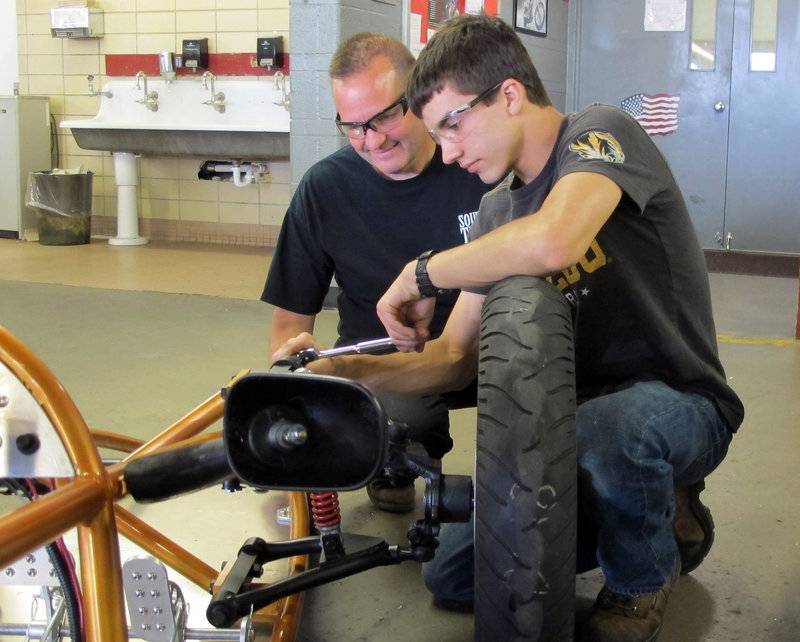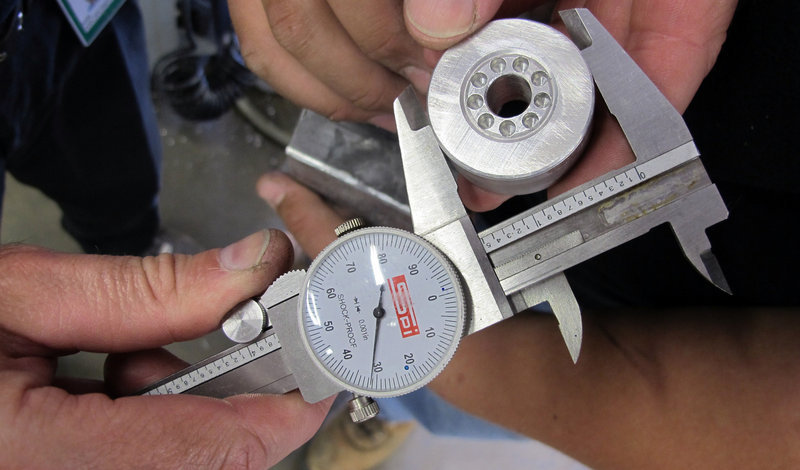The U.S. unemployment rate remains above 8 percent, and every politician extols the importance of job creation. Yet each month thousands of manufacturing jobs are there for the taking – but companies are unable to hire sufficiently skilled workers.
“Five percent of manufacturing jobs go unfilled every day because we can’t find the skilled work force,” said Jay Timmons, president of the National Association of Manufacturers.
At any given time, this skills gap represents about 600,000 open jobs. That’s a stark number given how much attention is focused on the high unemployment rate of 8.1 percent and weak monthly job numbers.
The vacant jobs involve skilled production positions such as machinists, production operators and technicians. Employers complain that they can’t find workers with the skills to calibrate machinery, do simple math and, even more troubling, simply show up to work.
In an attempt to whittle down this number of unfilled posts, manufacturers in 2010 began pushing creation of a portable skills certificate, one that would be recognized nationwide. A worker trained in California could land an aerospace manufacturing job in Missouri, an industrial job in Illinois or work in a factory in the Carolinas.
The trade association, through its public-service group, the Manufacturing Institute, set a goal of 500,000 such certificates by 2016.
Sandra Westlund-Deenihan also supports the effort. She’s president of Quality Float Works Inc., in Schaumburg, Ill. Her company makes float-valve assemblies that look similar to those used in toilet tanks, but they’re bigger and are used by the energy sector, cattle ranchers, industry and in sundry other commercial uses.
“This issue really became important to me … several years ago when I noticed how the skills levels for students (had) dropped,” she said, lamenting that so few job applicants can pass a sixth-grade math exam and fewer are trained in calibration. “I’ve seen the work force change dramatically. There are fewer workers available with the skills required.”
Quality Float Works employs 26, but efforts to add an additional three skilled workers have proved difficult. That’s despite the fact that the company pays as much as $80,000 annually.
“It’s very difficult for us to find people with the proper work skills,” said Westlund-Deenihan.
In 2011, the Manufacturing Institute’s Manufacturing Skills Certification System yielded almost 85,000 of the portable certificates that the group hopes to have recognized nationwide. That’s almost one-fifth of the goal.
The system provides what are actually known as “stackable” secondary education and post-secondary skills that employers have identified as necessary in order to get a job in manufacturing and advance up the career ladder. The “stackable” skills certificates cover everything from welding and applied math to demonstrable understanding of metalworking, packaging, construction, electronics and die casting.
To date, 113 colleges nationwide have partnered with the Manufacturing Institute, a number that is rising as more community colleges in particular participate. The institute is also working with community colleges to certify teachers who have industry-based credentials, putting the “human infrastructure” in place to allow the program to reach a gallop.
Thirty-six states now have some level of participation in the portable skills certificate effort. In Missouri, the state’s sole technical college — Linn State Technical College — is a big believer in the training effort. It draws from high schools around the state, bringing in students showing aptitude for a career in the trades. It had a prior effort under way with industry to ensure that kids could land jobs straight out of technical school, but it is joining the push for nationally recognized certification, in part because employers are asking for it.
“We’ve seen in an influx of employers,” said Victoria Schwinke, dean of academic affairs, adding that big-name manufacturers such as Johnson Controls, Unilever and Boeing actively support training
Students at Linn State who want to work as mill or lathe operators are trained on the latest Haas machines, which use computer numerical control technologies. They learn how to use sophisticated software for designing and cutting parts, as well as shop-floor technologies and the kind of production-line software used in top U.S. corporations.
This isn’t your grandfather’s dark and dingy machine shop. In fact, Linn State teachers meet regularly with industry leaders to ensure that what’s being taught is keeping up with the fast pace of new technologies.
“The process of change … is pretty quick and could cost students a good job because something wasn’t included,” said Kenny Honse, an industrial electronics instructor.
High schools are also involved in promoting the portable skills certification. At South Tech High School in Sunset Hills, Mo., a suburb of St. Louis, administrators are adopting a new curriculum with an eye toward certification.
“It takes a lot more training for that entry-level employee,” said Michael Rogg, director of career and technical education for Special School District, which oversees technical education in St. Louis County schools.
Most kids coming to South Tech go on to post-secondary studies. Many also go straight into decent-paying manufacturing jobs.
During a recent visit, Ian Mansche, 18, showed off computer numerical control skills. It’s a fancy way of saying he conducts computer-aided machine-cutting, writing the programs himself.
Mansche’s father owns a precision-scale company. The son hopes to develop skills that will allow him to expand the family firm into agriculture sectors, and armed with his training he’ll head to the University of Missouri for further education.
On the other side of the cavernous shop, Mike Finklang inspects a roadster he and classmates made from scratch. He was a poor math student until taking the skills-training courses at South Tech, but he finished the year with top grades in math now that he’s learned how to use it in the real world.
“Every day I hated it. I used to ask, ‘When will I use that?’” he said of math.
Finklang now harbors big aspirations. After doing a project that custom-fitted a snow ski for an amputee, he now hopes to start a company that makes prostheses for the athletically minded disabled.
Boeing helps to promote a robotics programs at South Tech, providing a mentor and sponsoring school competitions. The robotics program speaks to the level of sophistication involved in manufacturing today.
“It’s no longer a low-skill job,” said Matt Rola, the robotics instructor.
Copy the Story Link
Send questions/comments to the editors.




Success. Please wait for the page to reload. If the page does not reload within 5 seconds, please refresh the page.
Enter your email and password to access comments.
Hi, to comment on stories you must . This profile is in addition to your subscription and website login.
Already have a commenting profile? .
Invalid username/password.
Please check your email to confirm and complete your registration.
Only subscribers are eligible to post comments. Please subscribe or login first for digital access. Here’s why.
Use the form below to reset your password. When you've submitted your account email, we will send an email with a reset code.